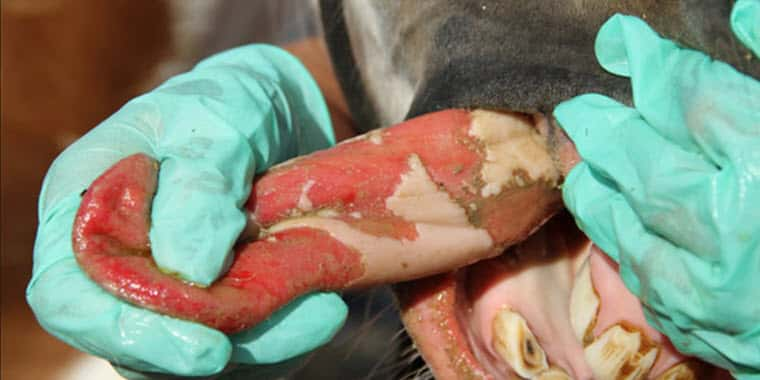One confirmed case of Vesicular Stomatitis (VSV), a reportable animal disease, has been found in Wyoming. National Veterinary Services Laboratory reported the disease to the Wyoming state veterinarian after testing samples that were submitted on Tuesday. The samples came from a horse with oral lesions suggestive of VSV. Other potentially affected animals in Goshen County are being investigated by Wyoming Livestock Board (WLSB) and USDA APHIS veterinarians.
The affected horse was at Cheyenne Frontier Days (CFD) for five days as a contract act horse before lesions were found. This horse was not stalled with or near any contestant horses. Upon finding suspicious lesions, the horse was quarantined and sent back to its Wyoming origin to be held in isolation away from all other livestock. No other symptomatic or clinical animals have been identified or reported. CFD staff, Wyoming Livestock Board staff and USDA APHIS staff are coordinating disease control efforts and conducting daily monitoring of all livestock at CFD Park. That will continue through the end of the event. All livestock determined to be at the greatest risk will be examined by a veterinarian prior to exit, and, if asymptomatic, will be issued a permit to leave the CFD Park.
The main symptoms of VSV are slobbering, blisters, sores and sloughing of skin in the mouth, on the tongue, on the muzzle, inside the ears and on the coronary band above the hooves. Lameness and weight loss may also occur. VSV-infected horses and/or cattle have been found already in 2015 in Colorado, New Mexico, Texas and Arizona. VSV can threaten other livestock species, including sheep, goats and pigs.
Flies and midges are the main vectors for VSV. The virus is also spread through direct contact with infected livestock and indirectly through contact with contaminated equipment and tack. Fly control is the most important step in preventing the disease. Good sanitation and bio-security measures can help avoid exposure.
Wyoming’s most recent previous outbreaks of VSV were in 2005 and 2006. Nearly all of the affected equine during those years were pastured along drainages or had very recent history of exposure to low-lying, riparian areas. We advise livestock owners, if possible, to move their healthy animals to higher, dryer ground until the VSV insect vector season subsides. That is generally after two hard frosts.
VSV is particularly significant because it is clinically indistinguishable from foot-and-mouth disease (FMD), swine vesicular disease, and vesicular exanthema of swine, all serious foreign animal diseases (FAD). Because of similarities to these FADs, it is essential to quickly confirm a diagnosis with laboratory testing. Of the vesicular diseases, VSV is the only one that affects horses, and the presence of lesions is suggestive of VS.
If you suspect VSV in your animals, contact your veterinarian immediately. Vesicular Stomatitis is a reportable disease that should be immediately reported to the Wyoming state veterinarian at 307-857-4140 or to the USDA APHIS Veterinary Services’ Wyoming Office at 307-432-7960.
For further information regarding this press release, please contact the Wyoming state veterinarian at 307-421-1682.
Source: Wyoming Livestock Board




